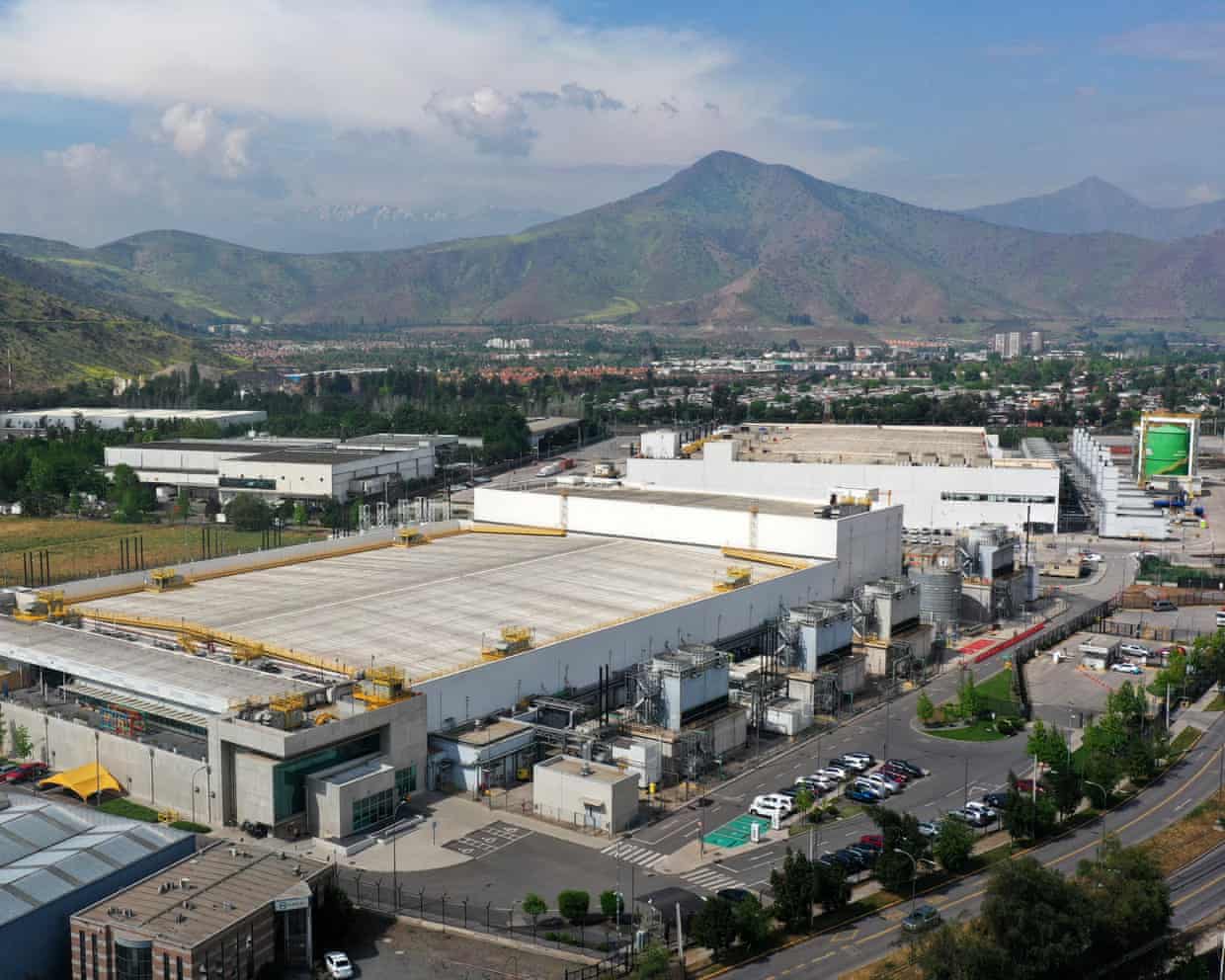Datacenters meet resistance over environmental concerns as AI boom spreads in Latin America

This Q&A originally appeared as part of The Guardian’s TechScape newsletter,Sign up for this weekly newsletter here,The datacenters that power the artificial intelligence boom are beyond enormous,Their financials, their physical scale, and the amount of information contained within are so massive that the idea of stopping their construction can seem like opposing an avalanche in progress,Despite the scale and momentum of the explosion of datacenters, resistance is mounting in the United States, in the United Kingdom, and in Latin America, where datacenters have been built in some of the world’s driest areas.
Local opposition in all three regions has often focused on the environmental impacts and resource consumption of the gargantuan structures.Paz Peña is a researcher and fellow with the Mozilla Foundation who studies the social and environmental impact of technology, particularly datacenters and particularly in Latin America.She spoke to the Guardian at the Mozilla festival in Barcelona about how communities in Latin America are going to court to pry information away from governments and corporations that would much rather keep it secret.The Guardian: Could you describe your research?Paz Peña: Basically, my research is about the positions of governments on datacenters and what the promises are behind them.What are the relationships that governments today in Latin America have with big tech? There’s a lot of lobbying activities around infrastructure and datacenters from big tech to governments in Latin America.
Chile and Brazil are the two top countries working on datacenters today in Latin America, and Chile is one of the countries in Latin America that has a lot of resistance against datacenters,What the governments are doing – I’m talking about leftwing governments … what they are looking for is foreign investment for datacenters in their countries,The amounts are great,It’s a public policy to attract [datacenters] with what they call national investment plans,They’re doing tax exemptions, for example, in Brazil, which is a huge controversy back there.
In the case of Chile, what they’re doing is actually trying to deregulate the environmental assessments that datacenters are going through.Carving out an exception for them?Peña: Exactly.There’s no specific category of environmental impact assessment for datacenters in Latin America.In the case of Chile right now, they are assessed on the diesel that they use, because they use diesel generators for energy.It’s huge amounts of diesel.
The government actually made an administrative change in the environmental system evaluation, where the threshold that datacenters need to achieve on diesel to pass an environmental assessment changed,Magically, that means that datacenters are not going through environmental impact assessments in Chile any more, which was the reason why communities understood what were the impacts of datacenters,They don’t have that information right now,What we’re seeing is that governments are creating opportunities for investments but not creating rules and regulations for the environmental impacts of datacenters, rules about diesel use, energy and water,Without that information on datacenters, do you see that the opposition to them is confused or hobbled because they don’t know what it is they’re opposing? Or does it incite more opposition because of the feeling of not being told what’s really going on?In the case of Chile, I would say that the local activism is quite angry with the leftwing government.
The promises of this government was to be an environmental, sustainable exercise of power, right? President [Gabriel] Boric actually said this, that he would form an ecological government.Nobody really believes that.But they put that in the discourse.So you have to pay your words, right?People are really mad.I would say for two reasons.
One is that they don’t have the transparency to understand what is going on in their neighborhoods.The second thing is they are super mad about it because the national datacenter plan, which is, again, a foreign investment plan, is presented for companies – but not necessarily for communities.When they actually publicly presented this plan, which was about two months ago, all the industry was present, but super few people from communities.Communities felt like they were being left out of the conversation.If there’s a datacenter planned for my neighborhood and I oppose it, what should I do?In a community, you will find people that understand what a datacenter is and some people will not have an idea of what it is.
So when they have heard, they probably heard by two sources: a government’s evaluation system or the media.So once they have heard about this, the main problem they have is, again, transparency.Because corporate secrecy is still super present around the resources that these datacenters need – energy, water, et cetera.Sign up to TechScapeA weekly dive in to how technology is shaping our livesafter newsletter promotionThe problem that we have seen this in Latin America – there’s an incredible example in Uruguay about this – is that governments actually agree with this corporate secrecy.When a community asks for more information, the government is saying: it’s corporate secrecy.
We cannot give you that information.So in general, what we are seeing is that communities are considering going to court to actually ask for that information.Because in Latin America, there is an inter-American agreement called the Escazú agreement, which is an environmental agreement about transparency, saying that a government cannot hide this incredibly important information for people.In the case of Uruguay, they went to court, because there was a Google datacenter being built in Uruguay in Montevideo, the capital.A couple of years ago, they’re going through an incredible drought where the people in Montevideo had to shower with buckets of water.
Meanwhile, the government announced that this Google datacenter, where the amounts of water needed would be immense.So people were asking if this water, this very scarce resource, should be going to Google or to people.This is a fair question.They didn’t know exactly how much water Google would need.So they asked the government.
The government said no.The environmental minister said: no, you cannot have that information because it’s corporate secrecy by Google.So they went to court, and they won, actually.The court quoted the Escazú agreement.When a community takes a public stance saying we want more information about this and that, and social and environmental impacts, the impression is that they are opposing progress, technological progress, economic progress.
Corporations, and I will say, sadly, governments – they see communities as a kind of roadblock,The first thing people need is information, and the first hurdle that they confront is the lack of information,So I would say that the first step they need to take is to find any source of information, and sometimes go to court,The majority of these actions are not successful, but they are sometimes the only way that corporations but also, sadly, governments give the information to the people,If you lose the fight, what should you do then if you’re a member of this community?For some communities in Chile that I interviewed, big tech companies weren’t actually the enemy, which is very interesting.
Datacenter plans were seen as sort of an opportunity to raise the bar of environmental measures, because the people in those communities are surrounded by so many bad corporate actors who pollute a lot and don’t even care.It’s not necessarily a movement against big tech.Not yet, I would say.Maybe later.For now, these communities see a tech company planning a datacenter as not as a bad actor, actually as a strategic opportunity to raise the bar of environmental care and measures in their own neighborhoods.
Big tech companies have this necessity of being the good player in the world, or at least being seen that way, so there is an opportunity for people to say, ‘Big tech has raised the bar of environmental care,So let’s try to put some sort of pressure to the other bad actors,’The enormous amounts of money and the physical scale of these things are so huge,They seem to operate on this inhumanly large level,How do people believe in their own opposition to these projects? They’re so massive that it kind of seems like you’re just saying no to an earthquake.
In general, people who are working against datacenters are people who have a background working on environmental issues.It’s people really used to the big fight.It’s people that really understand how difficult it is to deal with corporations and with governments.

Judy Bell obituary
In 1996, Judy Bell, who has died aged 89, was made the first female president of the United States Golf Association. It had taken 102 years before the USGA could bring itself to appoint a woman to their top job, but when it did so, it got it right.Bell was a good golfer, an even better administrator and diplomat, and someone with whom it was always a delight to talk about the game. She was extremely knowledgeable about all aspects of her sport and it was characteristic that she spent much of her time as president, until 1999, encouraging its spread in areas from which it had been excluded, including the inner cities.Right from the time she joined the USGA executive committee in 1987 she had travelled thousands of miles per year to encourage the creation of reasonably priced public facilities in the cities

Cowboys owner Jerry Jones speaks of grief over death of ‘unique’ Marshawn Kneeland at 24
Cowboys owner Jerry Jones has spoken about his grief at the death of Dallas defensive end Marshawn Kneeland last week.Kneeland, who was in his second year with the Cowboys, was 24 at the time of his death.“He was very unique in his zest for life, and he was very unique for his passion for the game,” Jones said on 105.3 The Fan in Dallas on Tuesday. “Of course, the saddest thing for someone like me is the fact that he’s only 24 years old

Dallas Mavericks fire GM Nico Harrison nine months after Luka Dončić trade
The Dallas Mavericks have fired general manager Nico Harrison, the team’s governor, Patrick Dumont, has confirmed.“This decision reflects our continued commitment to building a championship-caliber organization, one that delivers for our players, our partners, and most importantly, our fans,” Dumont said in a statement.His exit comes nine months after Harrison sent five-time first-team All-NBA selection Luka Dončić to the Los Angeles Lakers in a blockbuster trade. It also comes one day after Dumont, an owner of the Mavs and the team’s representative on the NBA’s board of governors, was seen talking to a fan who was wearing a Lakers Dončić jersey during Monday’s 116-114 home loss to the Milwaukee Bucks.“Fire Nico!” chants were audible during the fourth-quarter of the game, in which Dallas squandered a 13-point lead

Carlos Alcaraz battles back to beat Taylor Fritz: ATP Finals tennis – as it happened
Somehow, Carlos Alcaraz outlasted Taylor Fritz to win an absolute epic (2)6-7 7-5 6-3. Consequently, if Alex de Minaur beats Lorenzo Musetti tonight, the world no 1 is through to the semi-finals.Fritz may never have played better than he did this afternoon, his aggressive intentions clear from the outset as the first four games took 29 minutes. It was Alcaraz who broke first but Fritz soon struck back and dominated the eventual first-set tiebreaker.The second offered more of the same: brilliant tennis, Fritz the better player

The remarkable story of the 1879 Sydney riot that set the tone for 150 years of Ashes rivalry
Test cricket gets described as a gentleman’s game, but this is a lie. Rashes of gentility break out here and there, but it’s still a game birthed by rascals, popularised by crooks, and sustained by the patronage of louts. This story is one of the finest examples, just after the third Test ever played. It was Melbourne 1879 when Fred Spofforth lived up to his nickname of “The Demon”: he rissoled England with 6 for 48 in the first innings and 7 for 62 in the second, taking the first Test hat-trick along the way. In a timeless match, Australia won in three days

Trescothick defends England’s Ashes buildup and shrugs off hypocrisy jibes
Marcus Trescothick has defended England’s Ashes preparations after Ian Botham joined a chorus of criticism from former players over the decision to schedule just a single warm-up game, saying ex-professionals need to bear in mind that “times have dramatically changed in the way that cricket is done”.England’s assistant coach also laughed off attempts from the Australian media to compare his use of mints to help the ball swing in the 2005 Ashes with their own players’ notorious Sandpapergate controversy.England play the Lions on Thursday, their only game before the first Ashes Test starts next Friday. On Tuesday Botham, who has previously said that England’s schedule “borders on arrogance”, returned to the subject. “It’s not the way I would prepare

How to make the perfect beer cheese soup – recipe | Felicity Cloake's How to make the perfect …

Lilibet’s, London W1: ‘Pure joy, high drama, camp as heck’ – restaurant review | Grace Dent on restaurants

Helen Goh’s recipe for pear, chocolate and hazelnut torte | The sweet spot

More than a third of whisky drinkers are female. Time for the industry to wake up to women

Jimi Famurewa’s recipe for Marmite and leek homity pie

$1.50 mangoes: Australia’s best-value fruit and veg for November